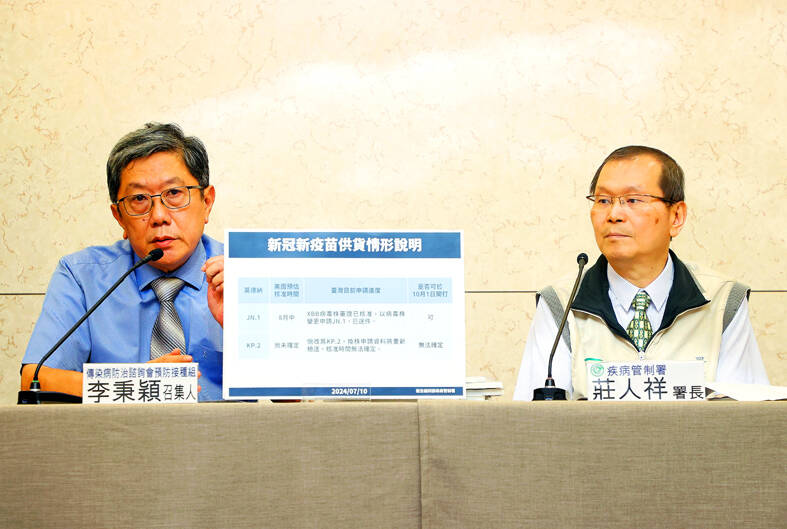Updated vaccines targeting the JN.1 variant of SARS-CoV-2 would be available from Oct. 1, health officials told a news briefing in Taipei yesterday.
The government urges people to get inoculated with any available COVID-19 vaccine, as shots with a 30 percent mismatch to the latest variants can retain up to 80 percent of their effectiveness, Advisory Committee on Immunization Practices convener Lee Ping-ing (李秉穎) said.
A recent WHO advisory states that governments should provide vaccinations as soon as doses become available and not try to obtain the latest vaccines at the expense of delaying inoculations, Lee said.

Photo: CNA
Centers for Disease Control (CDC) Director-General Chuang Jen-hsiang (莊人祥) said the centers selected vaccines targeting the JN.1 variant for the fall and winter, as newer vaccines targeting the KP.2 variant are not expected to be available outside North America soon.
Citing the government’s contract with Moderna, Chuang said that 5.5 million doses of JN.1-adapted vaccines would be delivered in the fall and winter, and another 2.7 million doses would arrive late next year.
The CDC plans to authorize COVID-19 vaccine subsidies on a year-by-year basis following the full delivery of Moderna vaccines next year, he said.
Meanwhile, Taiwanese are urged to get vaccinated with the remaining 2.7 million XBB-targeted vaccine doses, he said.
Influenza vaccinations would be administered concurrently with COVID-19 jabs, CDC Deputy Director-General Tseng Shu-hui (曾淑慧) said.
The new COVID-19 vaccines would first be available to doctors, nurses and hospital workers; people aged 65 or older; people of indigenous descent aged 55 or older; and people in long-term care facilities, Tseng said.
Children aged six months to 18 years; parents of infants younger than six months; childcare professionals; people with underlying health conditions aged 19 to 64; people with a body mass index higher than 30; people with rare diseases or serious injuries; and people who work in animal or human disease prevention are also eligible, she said.

SHIPS, TRAINS AND AUTOMOBILES: The ministry has announced changes to varied transportation industries taking effect soon, with a number of effects for passengers Beginning next month, the post office is canceling signature upon delivery and written inquiry services for international registered small packets in accordance with the new policy of the Universal Postal Union, the Ministry of Transportation and Communications said yesterday. The new policy does not apply to packets that are to be delivered to China, the ministry said. Senders of international registered small packets would receive a NT$10 rebate on postage if the packets are sent from Jan. 1 to March 31, it added. The ministry said that three other policies are also scheduled to take effect next month. International cruise ship operators

NUMBERS IMBALANCE: More than 4 million Taiwanese have visited China this year, while only about half a million Chinese have visited here Beijing has yet to respond to Taiwan’s requests for negotiation over matters related to the recovery of cross-strait tourism, the Tourism Administration said yesterday. Taiwan’s tourism authority issued the statement after Chinese-language daily the China Times reported yesterday that the government’s policy of banning group tours to China does not stop Taiwanese from visiting the country. As of October, more than 4.2 million had traveled to China this year, exceeding last year. Beijing estimated the number of Taiwanese tourists in China could reach 4.5 million this year. By contrast, only 500,000 Chinese tourists are expected in Taiwan, the report said. The report

HORROR STORIES: One victim recounted not realizing they had been stabbed and seeing people bleeding, while another recalled breaking down in tears after fleeing A man on Friday died after he tried to fight the knife-wielding suspect who went on a stabbing spree near two of Taipei’s busiest metro stations, Taipei Mayor Chiang Wan-an (蔣萬安) said. The 57-year-old man, identified by his family name, Yu (余), encountered the suspect at Exit M7 of Taipei Main Station and immediately tried to stop him, but was fatally wounded and later died, Chiang said, calling the incident “heartbreaking.” Yu’s family would receive at least NT$5 million (US$158,584) in compensation through the Taipei Rapid Transit Corp’s (TRTC) insurance coverage, he said after convening an emergency security response meeting yesterday morning. National

The Forestry and Nature Conservation Agency yesterday launched a gift box to market honey “certified by a Formosan black bear” in appreciation of a beekeeper’s amicable interaction with a honey-thieving bear. Beekeeper Chih Ming-chen (池明鎮) in January inspected his bee farm in Hualien County’s Jhuosi Township (卓溪) and found that more than 20 beehives had been destroyed and many hives were eaten, with bear droppings and paw prints near the destroyed hives, the agency said. Chih returned to the farm to move the remaining beehives away that evening when he encountered a Formosan black bear only 20m away, the agency said. The bear